Organisational Behaviour at Ryanair: Culture, Motivation, Teams
VerifiedAdded on 2020/12/30
|14
|4826
|217
Report
AI Summary
This report provides a comprehensive analysis of organizational behaviour within Ryanair, focusing on critical aspects such as organizational culture, power dynamics, and political behaviour. It explores the application of Handy's typology to understand Ryanair's culture and French and Raven's model to analyze power structures. The report also evaluates how organizational culture impacts staff feelings, behaviour, and overall performance. Furthermore, it assesses the role of process and content theories of motivation, including Vroom's expectancy theory and Maslow's hierarchy of needs, in driving individual and team performance. The report identifies different team types and their significance to organizational success, along with an analysis of team effectiveness using relevant theories. It concludes by examining the use of path-goal theory to improve team performance and productivity, and highlights potential barriers in implementing new organizational structures within Ryanair. This report provides valuable insights into the complexities of organizational behaviour and its impact on the airline's operations.
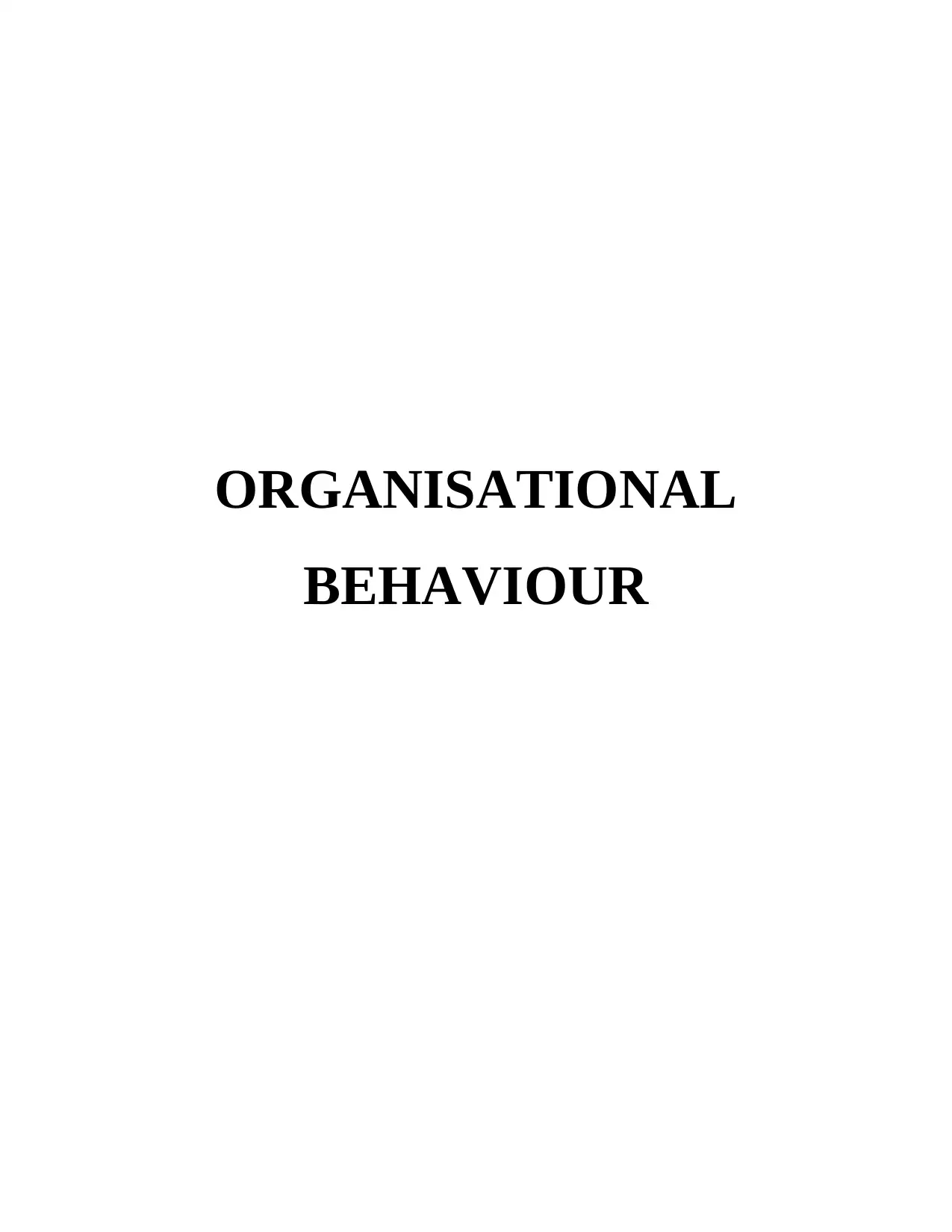
ORGANISATIONAL
BEHAVIOUR
BEHAVIOUR
Paraphrase This Document
Need a fresh take? Get an instant paraphrase of this document with our AI Paraphraser
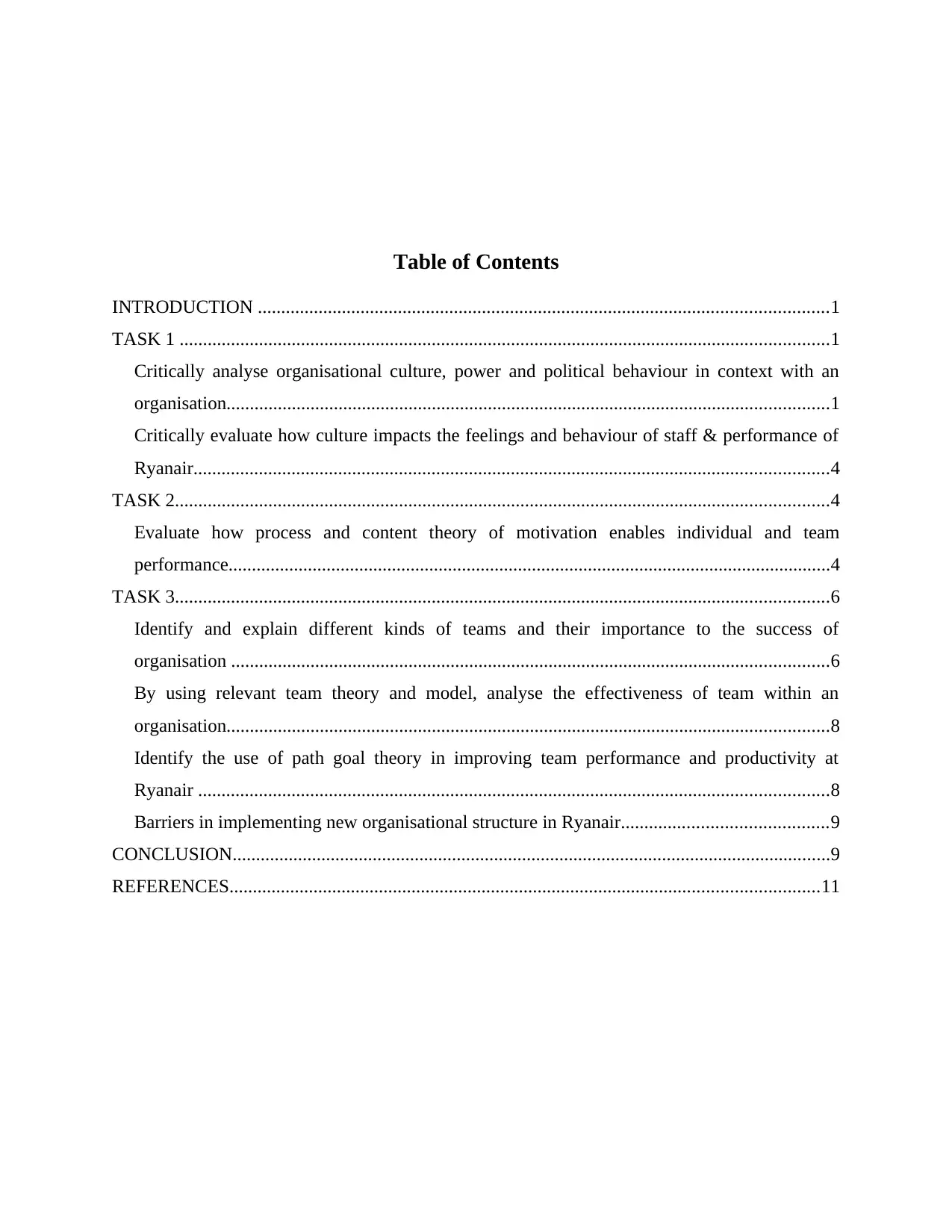
Table of Contents
INTRODUCTION ..........................................................................................................................1
TASK 1 ...........................................................................................................................................1
Critically analyse organisational culture, power and political behaviour in context with an
organisation.................................................................................................................................1
Critically evaluate how culture impacts the feelings and behaviour of staff & performance of
Ryanair........................................................................................................................................4
TASK 2............................................................................................................................................4
Evaluate how process and content theory of motivation enables individual and team
performance.................................................................................................................................4
TASK 3............................................................................................................................................6
Identify and explain different kinds of teams and their importance to the success of
organisation ................................................................................................................................6
By using relevant team theory and model, analyse the effectiveness of team within an
organisation.................................................................................................................................8
Identify the use of path goal theory in improving team performance and productivity at
Ryanair .......................................................................................................................................8
Barriers in implementing new organisational structure in Ryanair............................................9
CONCLUSION................................................................................................................................9
REFERENCES..............................................................................................................................11
INTRODUCTION ..........................................................................................................................1
TASK 1 ...........................................................................................................................................1
Critically analyse organisational culture, power and political behaviour in context with an
organisation.................................................................................................................................1
Critically evaluate how culture impacts the feelings and behaviour of staff & performance of
Ryanair........................................................................................................................................4
TASK 2............................................................................................................................................4
Evaluate how process and content theory of motivation enables individual and team
performance.................................................................................................................................4
TASK 3............................................................................................................................................6
Identify and explain different kinds of teams and their importance to the success of
organisation ................................................................................................................................6
By using relevant team theory and model, analyse the effectiveness of team within an
organisation.................................................................................................................................8
Identify the use of path goal theory in improving team performance and productivity at
Ryanair .......................................................................................................................................8
Barriers in implementing new organisational structure in Ryanair............................................9
CONCLUSION................................................................................................................................9
REFERENCES..............................................................................................................................11
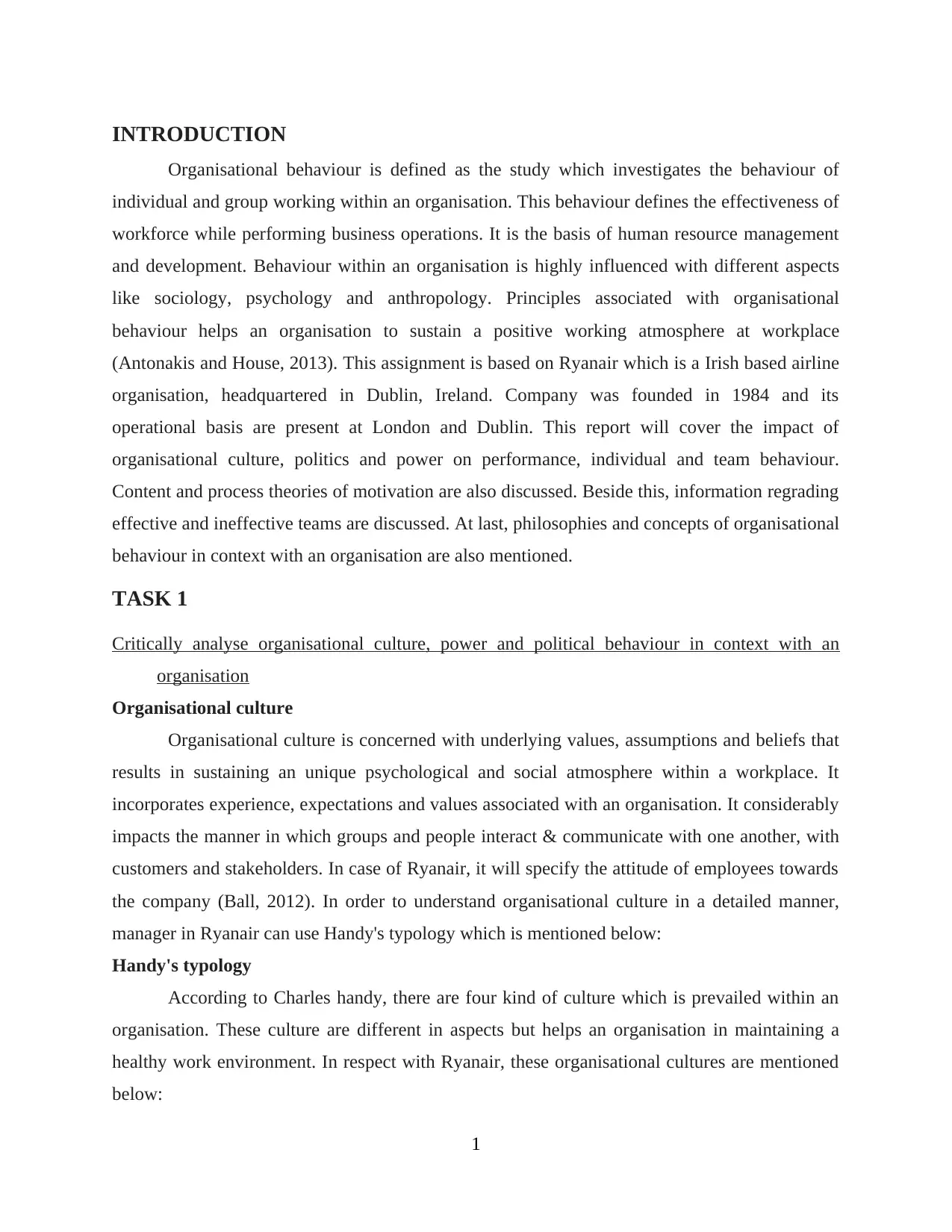
INTRODUCTION
Organisational behaviour is defined as the study which investigates the behaviour of
individual and group working within an organisation. This behaviour defines the effectiveness of
workforce while performing business operations. It is the basis of human resource management
and development. Behaviour within an organisation is highly influenced with different aspects
like sociology, psychology and anthropology. Principles associated with organisational
behaviour helps an organisation to sustain a positive working atmosphere at workplace
(Antonakis and House, 2013). This assignment is based on Ryanair which is a Irish based airline
organisation, headquartered in Dublin, Ireland. Company was founded in 1984 and its
operational basis are present at London and Dublin. This report will cover the impact of
organisational culture, politics and power on performance, individual and team behaviour.
Content and process theories of motivation are also discussed. Beside this, information regrading
effective and ineffective teams are discussed. At last, philosophies and concepts of organisational
behaviour in context with an organisation are also mentioned.
TASK 1
Critically analyse organisational culture, power and political behaviour in context with an
organisation
Organisational culture
Organisational culture is concerned with underlying values, assumptions and beliefs that
results in sustaining an unique psychological and social atmosphere within a workplace. It
incorporates experience, expectations and values associated with an organisation. It considerably
impacts the manner in which groups and people interact & communicate with one another, with
customers and stakeholders. In case of Ryanair, it will specify the attitude of employees towards
the company (Ball, 2012). In order to understand organisational culture in a detailed manner,
manager in Ryanair can use Handy's typology which is mentioned below:
Handy's typology
According to Charles handy, there are four kind of culture which is prevailed within an
organisation. These culture are different in aspects but helps an organisation in maintaining a
healthy work environment. In respect with Ryanair, these organisational cultures are mentioned
below:
1
Organisational behaviour is defined as the study which investigates the behaviour of
individual and group working within an organisation. This behaviour defines the effectiveness of
workforce while performing business operations. It is the basis of human resource management
and development. Behaviour within an organisation is highly influenced with different aspects
like sociology, psychology and anthropology. Principles associated with organisational
behaviour helps an organisation to sustain a positive working atmosphere at workplace
(Antonakis and House, 2013). This assignment is based on Ryanair which is a Irish based airline
organisation, headquartered in Dublin, Ireland. Company was founded in 1984 and its
operational basis are present at London and Dublin. This report will cover the impact of
organisational culture, politics and power on performance, individual and team behaviour.
Content and process theories of motivation are also discussed. Beside this, information regrading
effective and ineffective teams are discussed. At last, philosophies and concepts of organisational
behaviour in context with an organisation are also mentioned.
TASK 1
Critically analyse organisational culture, power and political behaviour in context with an
organisation
Organisational culture
Organisational culture is concerned with underlying values, assumptions and beliefs that
results in sustaining an unique psychological and social atmosphere within a workplace. It
incorporates experience, expectations and values associated with an organisation. It considerably
impacts the manner in which groups and people interact & communicate with one another, with
customers and stakeholders. In case of Ryanair, it will specify the attitude of employees towards
the company (Ball, 2012). In order to understand organisational culture in a detailed manner,
manager in Ryanair can use Handy's typology which is mentioned below:
Handy's typology
According to Charles handy, there are four kind of culture which is prevailed within an
organisation. These culture are different in aspects but helps an organisation in maintaining a
healthy work environment. In respect with Ryanair, these organisational cultures are mentioned
below:
1
⊘ This is a preview!⊘
Do you want full access?
Subscribe today to unlock all pages.

Trusted by 1+ million students worldwide
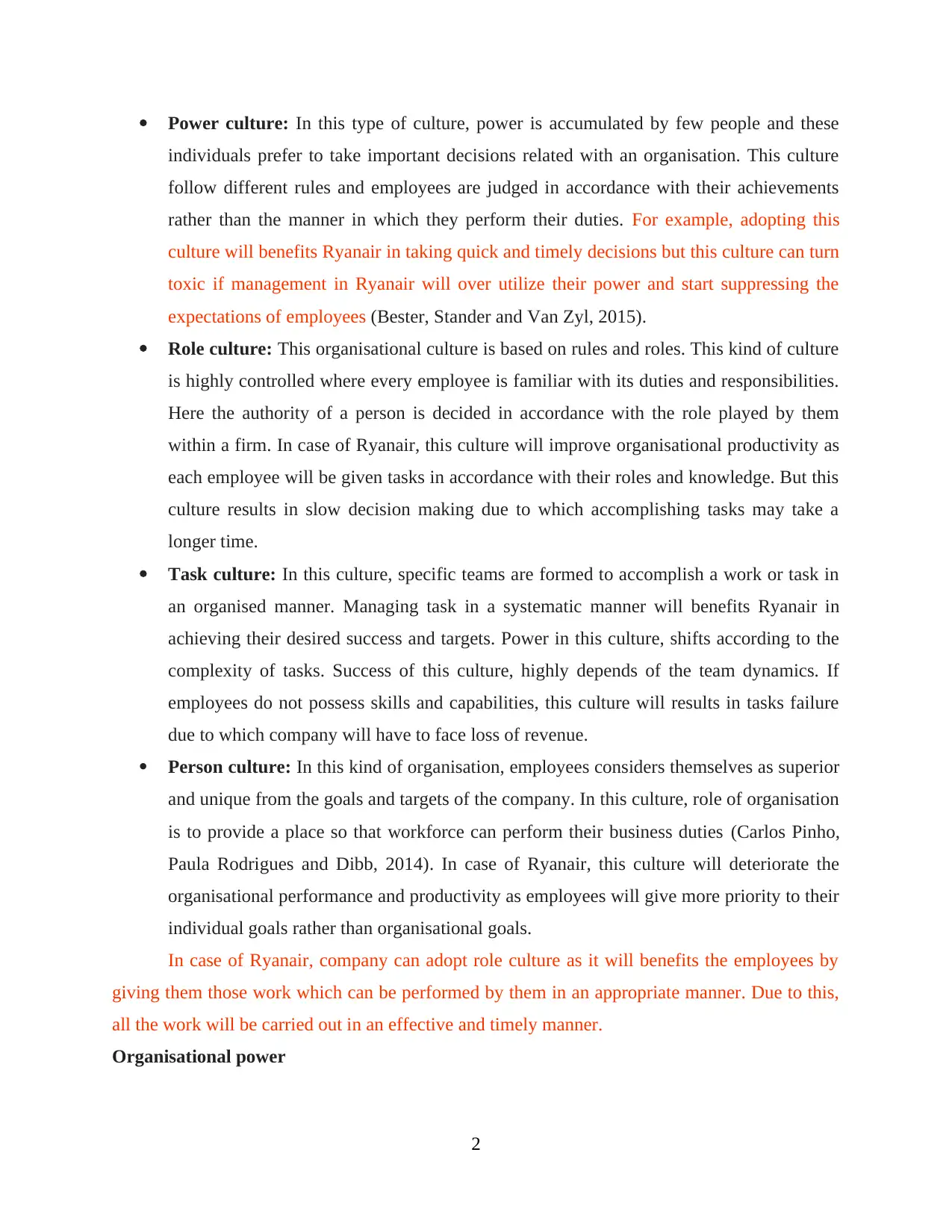
Power culture: In this type of culture, power is accumulated by few people and these
individuals prefer to take important decisions related with an organisation. This culture
follow different rules and employees are judged in accordance with their achievements
rather than the manner in which they perform their duties. For example, adopting this
culture will benefits Ryanair in taking quick and timely decisions but this culture can turn
toxic if management in Ryanair will over utilize their power and start suppressing the
expectations of employees (Bester, Stander and Van Zyl, 2015).
Role culture: This organisational culture is based on rules and roles. This kind of culture
is highly controlled where every employee is familiar with its duties and responsibilities.
Here the authority of a person is decided in accordance with the role played by them
within a firm. In case of Ryanair, this culture will improve organisational productivity as
each employee will be given tasks in accordance with their roles and knowledge. But this
culture results in slow decision making due to which accomplishing tasks may take a
longer time.
Task culture: In this culture, specific teams are formed to accomplish a work or task in
an organised manner. Managing task in a systematic manner will benefits Ryanair in
achieving their desired success and targets. Power in this culture, shifts according to the
complexity of tasks. Success of this culture, highly depends of the team dynamics. If
employees do not possess skills and capabilities, this culture will results in tasks failure
due to which company will have to face loss of revenue.
Person culture: In this kind of organisation, employees considers themselves as superior
and unique from the goals and targets of the company. In this culture, role of organisation
is to provide a place so that workforce can perform their business duties (Carlos Pinho,
Paula Rodrigues and Dibb, 2014). In case of Ryanair, this culture will deteriorate the
organisational performance and productivity as employees will give more priority to their
individual goals rather than organisational goals.
In case of Ryanair, company can adopt role culture as it will benefits the employees by
giving them those work which can be performed by them in an appropriate manner. Due to this,
all the work will be carried out in an effective and timely manner.
Organisational power
2
individuals prefer to take important decisions related with an organisation. This culture
follow different rules and employees are judged in accordance with their achievements
rather than the manner in which they perform their duties. For example, adopting this
culture will benefits Ryanair in taking quick and timely decisions but this culture can turn
toxic if management in Ryanair will over utilize their power and start suppressing the
expectations of employees (Bester, Stander and Van Zyl, 2015).
Role culture: This organisational culture is based on rules and roles. This kind of culture
is highly controlled where every employee is familiar with its duties and responsibilities.
Here the authority of a person is decided in accordance with the role played by them
within a firm. In case of Ryanair, this culture will improve organisational productivity as
each employee will be given tasks in accordance with their roles and knowledge. But this
culture results in slow decision making due to which accomplishing tasks may take a
longer time.
Task culture: In this culture, specific teams are formed to accomplish a work or task in
an organised manner. Managing task in a systematic manner will benefits Ryanair in
achieving their desired success and targets. Power in this culture, shifts according to the
complexity of tasks. Success of this culture, highly depends of the team dynamics. If
employees do not possess skills and capabilities, this culture will results in tasks failure
due to which company will have to face loss of revenue.
Person culture: In this kind of organisation, employees considers themselves as superior
and unique from the goals and targets of the company. In this culture, role of organisation
is to provide a place so that workforce can perform their business duties (Carlos Pinho,
Paula Rodrigues and Dibb, 2014). In case of Ryanair, this culture will deteriorate the
organisational performance and productivity as employees will give more priority to their
individual goals rather than organisational goals.
In case of Ryanair, company can adopt role culture as it will benefits the employees by
giving them those work which can be performed by them in an appropriate manner. Due to this,
all the work will be carried out in an effective and timely manner.
Organisational power
2
Paraphrase This Document
Need a fresh take? Get an instant paraphrase of this document with our AI Paraphraser
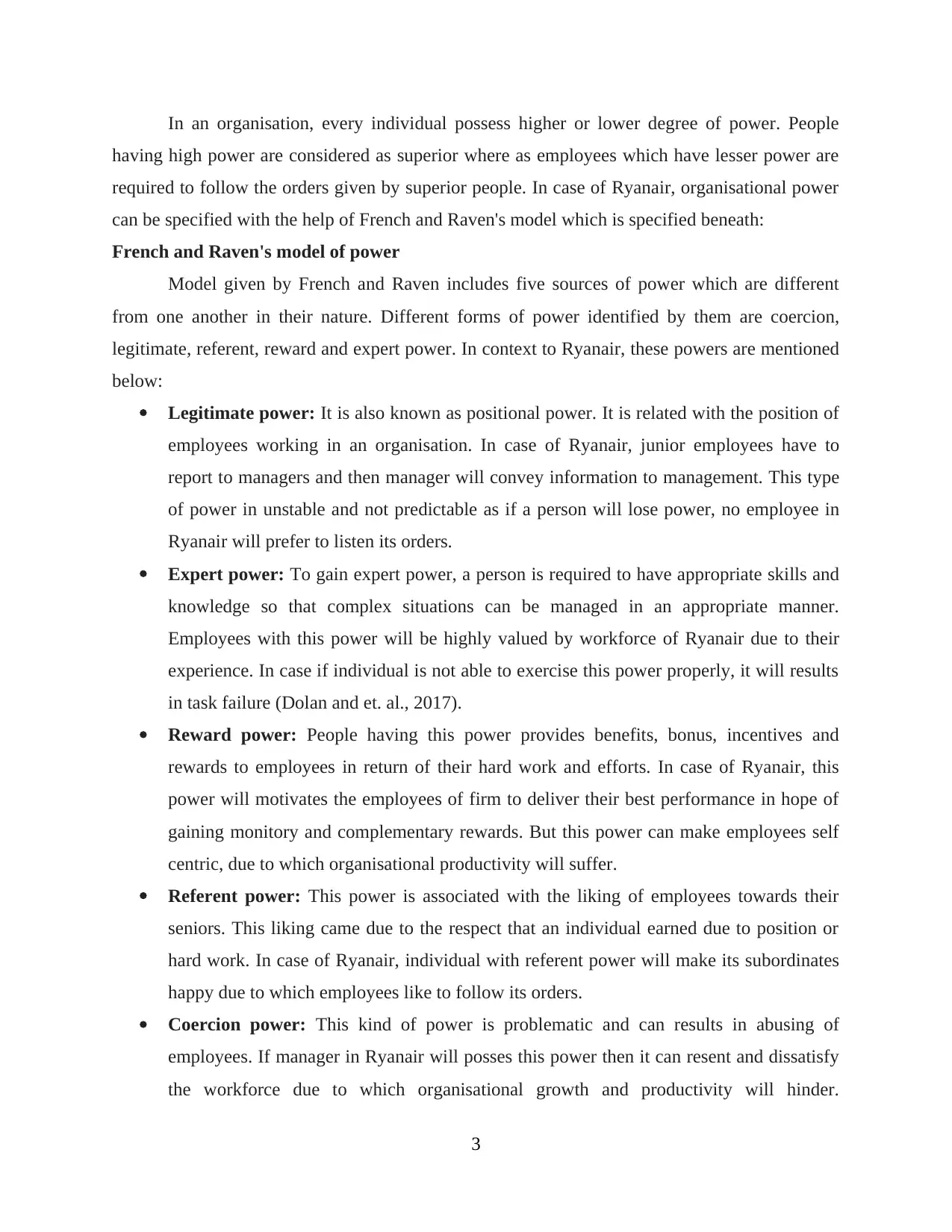
In an organisation, every individual possess higher or lower degree of power. People
having high power are considered as superior where as employees which have lesser power are
required to follow the orders given by superior people. In case of Ryanair, organisational power
can be specified with the help of French and Raven's model which is specified beneath:
French and Raven's model of power
Model given by French and Raven includes five sources of power which are different
from one another in their nature. Different forms of power identified by them are coercion,
legitimate, referent, reward and expert power. In context to Ryanair, these powers are mentioned
below:
Legitimate power: It is also known as positional power. It is related with the position of
employees working in an organisation. In case of Ryanair, junior employees have to
report to managers and then manager will convey information to management. This type
of power in unstable and not predictable as if a person will lose power, no employee in
Ryanair will prefer to listen its orders.
Expert power: To gain expert power, a person is required to have appropriate skills and
knowledge so that complex situations can be managed in an appropriate manner.
Employees with this power will be highly valued by workforce of Ryanair due to their
experience. In case if individual is not able to exercise this power properly, it will results
in task failure (Dolan and et. al., 2017).
Reward power: People having this power provides benefits, bonus, incentives and
rewards to employees in return of their hard work and efforts. In case of Ryanair, this
power will motivates the employees of firm to deliver their best performance in hope of
gaining monitory and complementary rewards. But this power can make employees self
centric, due to which organisational productivity will suffer.
Referent power: This power is associated with the liking of employees towards their
seniors. This liking came due to the respect that an individual earned due to position or
hard work. In case of Ryanair, individual with referent power will make its subordinates
happy due to which employees like to follow its orders.
Coercion power: This kind of power is problematic and can results in abusing of
employees. If manager in Ryanair will posses this power then it can resent and dissatisfy
the workforce due to which organisational growth and productivity will hinder.
3
having high power are considered as superior where as employees which have lesser power are
required to follow the orders given by superior people. In case of Ryanair, organisational power
can be specified with the help of French and Raven's model which is specified beneath:
French and Raven's model of power
Model given by French and Raven includes five sources of power which are different
from one another in their nature. Different forms of power identified by them are coercion,
legitimate, referent, reward and expert power. In context to Ryanair, these powers are mentioned
below:
Legitimate power: It is also known as positional power. It is related with the position of
employees working in an organisation. In case of Ryanair, junior employees have to
report to managers and then manager will convey information to management. This type
of power in unstable and not predictable as if a person will lose power, no employee in
Ryanair will prefer to listen its orders.
Expert power: To gain expert power, a person is required to have appropriate skills and
knowledge so that complex situations can be managed in an appropriate manner.
Employees with this power will be highly valued by workforce of Ryanair due to their
experience. In case if individual is not able to exercise this power properly, it will results
in task failure (Dolan and et. al., 2017).
Reward power: People having this power provides benefits, bonus, incentives and
rewards to employees in return of their hard work and efforts. In case of Ryanair, this
power will motivates the employees of firm to deliver their best performance in hope of
gaining monitory and complementary rewards. But this power can make employees self
centric, due to which organisational productivity will suffer.
Referent power: This power is associated with the liking of employees towards their
seniors. This liking came due to the respect that an individual earned due to position or
hard work. In case of Ryanair, individual with referent power will make its subordinates
happy due to which employees like to follow its orders.
Coercion power: This kind of power is problematic and can results in abusing of
employees. If manager in Ryanair will posses this power then it can resent and dissatisfy
the workforce due to which organisational growth and productivity will hinder.
3
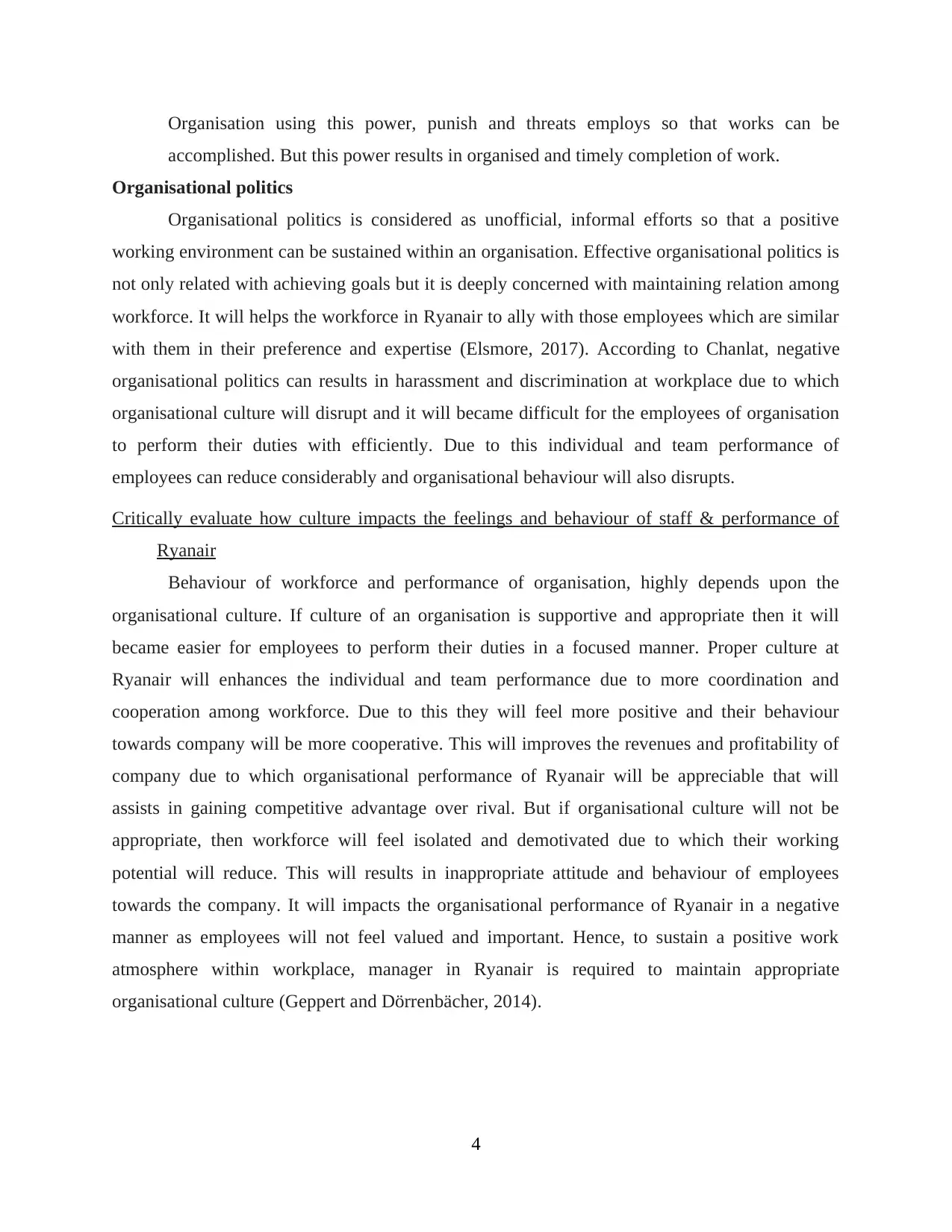
Organisation using this power, punish and threats employs so that works can be
accomplished. But this power results in organised and timely completion of work.
Organisational politics
Organisational politics is considered as unofficial, informal efforts so that a positive
working environment can be sustained within an organisation. Effective organisational politics is
not only related with achieving goals but it is deeply concerned with maintaining relation among
workforce. It will helps the workforce in Ryanair to ally with those employees which are similar
with them in their preference and expertise (Elsmore, 2017). According to Chanlat, negative
organisational politics can results in harassment and discrimination at workplace due to which
organisational culture will disrupt and it will became difficult for the employees of organisation
to perform their duties with efficiently. Due to this individual and team performance of
employees can reduce considerably and organisational behaviour will also disrupts.
Critically evaluate how culture impacts the feelings and behaviour of staff & performance of
Ryanair
Behaviour of workforce and performance of organisation, highly depends upon the
organisational culture. If culture of an organisation is supportive and appropriate then it will
became easier for employees to perform their duties in a focused manner. Proper culture at
Ryanair will enhances the individual and team performance due to more coordination and
cooperation among workforce. Due to this they will feel more positive and their behaviour
towards company will be more cooperative. This will improves the revenues and profitability of
company due to which organisational performance of Ryanair will be appreciable that will
assists in gaining competitive advantage over rival. But if organisational culture will not be
appropriate, then workforce will feel isolated and demotivated due to which their working
potential will reduce. This will results in inappropriate attitude and behaviour of employees
towards the company. It will impacts the organisational performance of Ryanair in a negative
manner as employees will not feel valued and important. Hence, to sustain a positive work
atmosphere within workplace, manager in Ryanair is required to maintain appropriate
organisational culture (Geppert and Dörrenbächer, 2014).
4
accomplished. But this power results in organised and timely completion of work.
Organisational politics
Organisational politics is considered as unofficial, informal efforts so that a positive
working environment can be sustained within an organisation. Effective organisational politics is
not only related with achieving goals but it is deeply concerned with maintaining relation among
workforce. It will helps the workforce in Ryanair to ally with those employees which are similar
with them in their preference and expertise (Elsmore, 2017). According to Chanlat, negative
organisational politics can results in harassment and discrimination at workplace due to which
organisational culture will disrupt and it will became difficult for the employees of organisation
to perform their duties with efficiently. Due to this individual and team performance of
employees can reduce considerably and organisational behaviour will also disrupts.
Critically evaluate how culture impacts the feelings and behaviour of staff & performance of
Ryanair
Behaviour of workforce and performance of organisation, highly depends upon the
organisational culture. If culture of an organisation is supportive and appropriate then it will
became easier for employees to perform their duties in a focused manner. Proper culture at
Ryanair will enhances the individual and team performance due to more coordination and
cooperation among workforce. Due to this they will feel more positive and their behaviour
towards company will be more cooperative. This will improves the revenues and profitability of
company due to which organisational performance of Ryanair will be appreciable that will
assists in gaining competitive advantage over rival. But if organisational culture will not be
appropriate, then workforce will feel isolated and demotivated due to which their working
potential will reduce. This will results in inappropriate attitude and behaviour of employees
towards the company. It will impacts the organisational performance of Ryanair in a negative
manner as employees will not feel valued and important. Hence, to sustain a positive work
atmosphere within workplace, manager in Ryanair is required to maintain appropriate
organisational culture (Geppert and Dörrenbächer, 2014).
4
⊘ This is a preview!⊘
Do you want full access?
Subscribe today to unlock all pages.

Trusted by 1+ million students worldwide
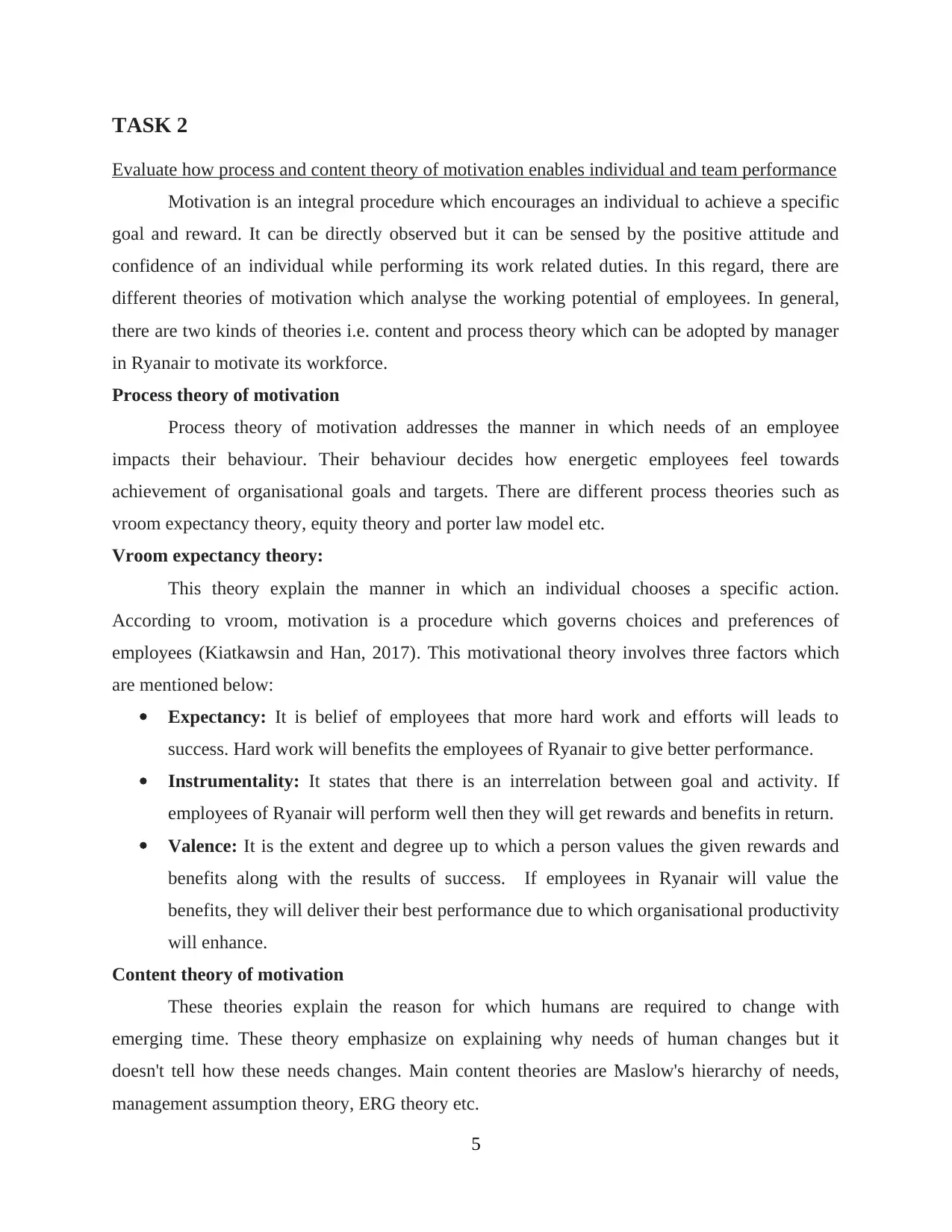
TASK 2
Evaluate how process and content theory of motivation enables individual and team performance
Motivation is an integral procedure which encourages an individual to achieve a specific
goal and reward. It can be directly observed but it can be sensed by the positive attitude and
confidence of an individual while performing its work related duties. In this regard, there are
different theories of motivation which analyse the working potential of employees. In general,
there are two kinds of theories i.e. content and process theory which can be adopted by manager
in Ryanair to motivate its workforce.
Process theory of motivation
Process theory of motivation addresses the manner in which needs of an employee
impacts their behaviour. Their behaviour decides how energetic employees feel towards
achievement of organisational goals and targets. There are different process theories such as
vroom expectancy theory, equity theory and porter law model etc.
Vroom expectancy theory:
This theory explain the manner in which an individual chooses a specific action.
According to vroom, motivation is a procedure which governs choices and preferences of
employees (Kiatkawsin and Han, 2017). This motivational theory involves three factors which
are mentioned below:
Expectancy: It is belief of employees that more hard work and efforts will leads to
success. Hard work will benefits the employees of Ryanair to give better performance.
Instrumentality: It states that there is an interrelation between goal and activity. If
employees of Ryanair will perform well then they will get rewards and benefits in return.
Valence: It is the extent and degree up to which a person values the given rewards and
benefits along with the results of success. If employees in Ryanair will value the
benefits, they will deliver their best performance due to which organisational productivity
will enhance.
Content theory of motivation
These theories explain the reason for which humans are required to change with
emerging time. These theory emphasize on explaining why needs of human changes but it
doesn't tell how these needs changes. Main content theories are Maslow's hierarchy of needs,
management assumption theory, ERG theory etc.
5
Evaluate how process and content theory of motivation enables individual and team performance
Motivation is an integral procedure which encourages an individual to achieve a specific
goal and reward. It can be directly observed but it can be sensed by the positive attitude and
confidence of an individual while performing its work related duties. In this regard, there are
different theories of motivation which analyse the working potential of employees. In general,
there are two kinds of theories i.e. content and process theory which can be adopted by manager
in Ryanair to motivate its workforce.
Process theory of motivation
Process theory of motivation addresses the manner in which needs of an employee
impacts their behaviour. Their behaviour decides how energetic employees feel towards
achievement of organisational goals and targets. There are different process theories such as
vroom expectancy theory, equity theory and porter law model etc.
Vroom expectancy theory:
This theory explain the manner in which an individual chooses a specific action.
According to vroom, motivation is a procedure which governs choices and preferences of
employees (Kiatkawsin and Han, 2017). This motivational theory involves three factors which
are mentioned below:
Expectancy: It is belief of employees that more hard work and efforts will leads to
success. Hard work will benefits the employees of Ryanair to give better performance.
Instrumentality: It states that there is an interrelation between goal and activity. If
employees of Ryanair will perform well then they will get rewards and benefits in return.
Valence: It is the extent and degree up to which a person values the given rewards and
benefits along with the results of success. If employees in Ryanair will value the
benefits, they will deliver their best performance due to which organisational productivity
will enhance.
Content theory of motivation
These theories explain the reason for which humans are required to change with
emerging time. These theory emphasize on explaining why needs of human changes but it
doesn't tell how these needs changes. Main content theories are Maslow's hierarchy of needs,
management assumption theory, ERG theory etc.
5
Paraphrase This Document
Need a fresh take? Get an instant paraphrase of this document with our AI Paraphraser
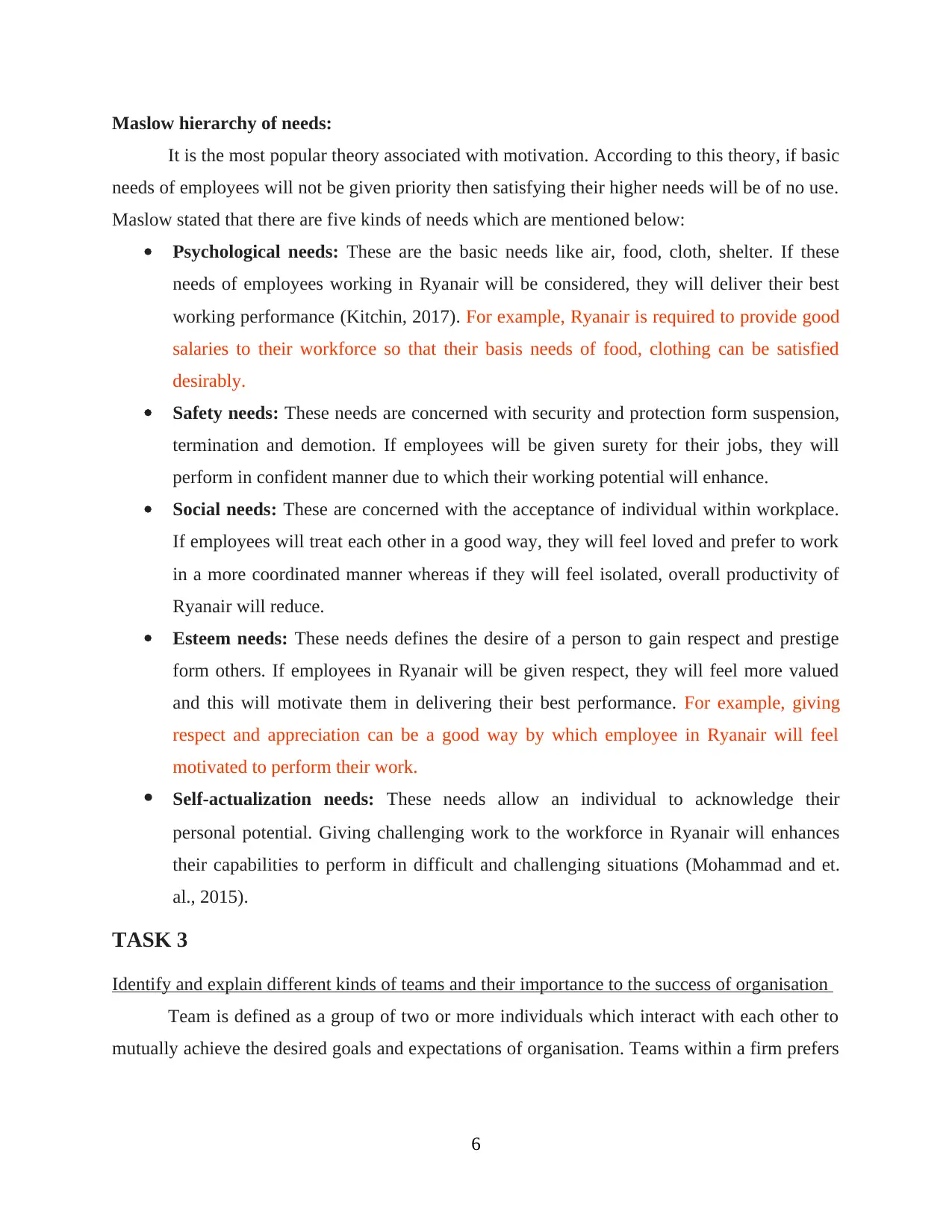
Maslow hierarchy of needs:
It is the most popular theory associated with motivation. According to this theory, if basic
needs of employees will not be given priority then satisfying their higher needs will be of no use.
Maslow stated that there are five kinds of needs which are mentioned below:
Psychological needs: These are the basic needs like air, food, cloth, shelter. If these
needs of employees working in Ryanair will be considered, they will deliver their best
working performance (Kitchin, 2017). For example, Ryanair is required to provide good
salaries to their workforce so that their basis needs of food, clothing can be satisfied
desirably.
Safety needs: These needs are concerned with security and protection form suspension,
termination and demotion. If employees will be given surety for their jobs, they will
perform in confident manner due to which their working potential will enhance.
Social needs: These are concerned with the acceptance of individual within workplace.
If employees will treat each other in a good way, they will feel loved and prefer to work
in a more coordinated manner whereas if they will feel isolated, overall productivity of
Ryanair will reduce.
Esteem needs: These needs defines the desire of a person to gain respect and prestige
form others. If employees in Ryanair will be given respect, they will feel more valued
and this will motivate them in delivering their best performance. For example, giving
respect and appreciation can be a good way by which employee in Ryanair will feel
motivated to perform their work.
Self-actualization needs: These needs allow an individual to acknowledge their
personal potential. Giving challenging work to the workforce in Ryanair will enhances
their capabilities to perform in difficult and challenging situations (Mohammad and et.
al., 2015).
TASK 3
Identify and explain different kinds of teams and their importance to the success of organisation
Team is defined as a group of two or more individuals which interact with each other to
mutually achieve the desired goals and expectations of organisation. Teams within a firm prefers
6
It is the most popular theory associated with motivation. According to this theory, if basic
needs of employees will not be given priority then satisfying their higher needs will be of no use.
Maslow stated that there are five kinds of needs which are mentioned below:
Psychological needs: These are the basic needs like air, food, cloth, shelter. If these
needs of employees working in Ryanair will be considered, they will deliver their best
working performance (Kitchin, 2017). For example, Ryanair is required to provide good
salaries to their workforce so that their basis needs of food, clothing can be satisfied
desirably.
Safety needs: These needs are concerned with security and protection form suspension,
termination and demotion. If employees will be given surety for their jobs, they will
perform in confident manner due to which their working potential will enhance.
Social needs: These are concerned with the acceptance of individual within workplace.
If employees will treat each other in a good way, they will feel loved and prefer to work
in a more coordinated manner whereas if they will feel isolated, overall productivity of
Ryanair will reduce.
Esteem needs: These needs defines the desire of a person to gain respect and prestige
form others. If employees in Ryanair will be given respect, they will feel more valued
and this will motivate them in delivering their best performance. For example, giving
respect and appreciation can be a good way by which employee in Ryanair will feel
motivated to perform their work.
Self-actualization needs: These needs allow an individual to acknowledge their
personal potential. Giving challenging work to the workforce in Ryanair will enhances
their capabilities to perform in difficult and challenging situations (Mohammad and et.
al., 2015).
TASK 3
Identify and explain different kinds of teams and their importance to the success of organisation
Team is defined as a group of two or more individuals which interact with each other to
mutually achieve the desired goals and expectations of organisation. Teams within a firm prefers
6
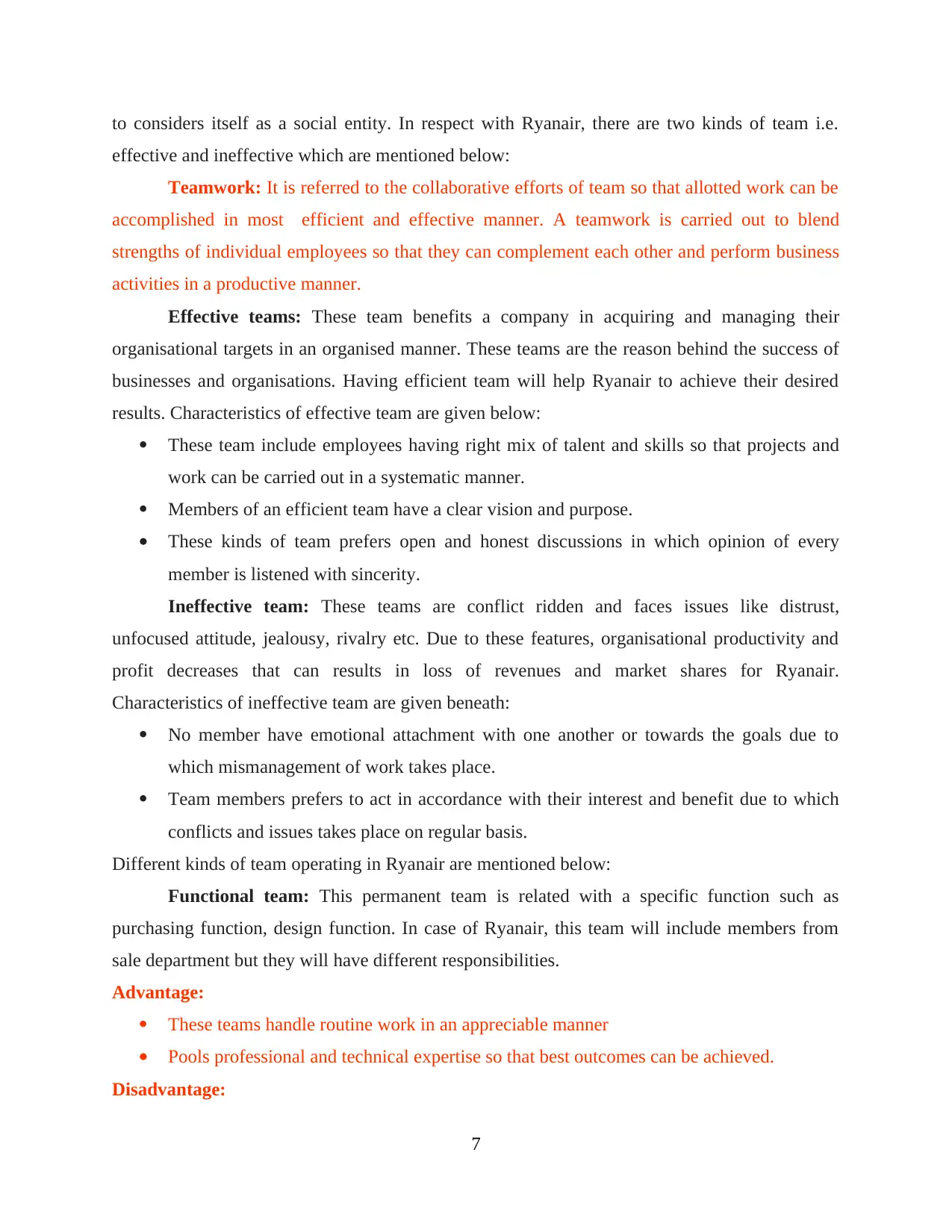
to considers itself as a social entity. In respect with Ryanair, there are two kinds of team i.e.
effective and ineffective which are mentioned below:
Teamwork: It is referred to the collaborative efforts of team so that allotted work can be
accomplished in most efficient and effective manner. A teamwork is carried out to blend
strengths of individual employees so that they can complement each other and perform business
activities in a productive manner.
Effective teams: These team benefits a company in acquiring and managing their
organisational targets in an organised manner. These teams are the reason behind the success of
businesses and organisations. Having efficient team will help Ryanair to achieve their desired
results. Characteristics of effective team are given below:
These team include employees having right mix of talent and skills so that projects and
work can be carried out in a systematic manner.
Members of an efficient team have a clear vision and purpose.
These kinds of team prefers open and honest discussions in which opinion of every
member is listened with sincerity.
Ineffective team: These teams are conflict ridden and faces issues like distrust,
unfocused attitude, jealousy, rivalry etc. Due to these features, organisational productivity and
profit decreases that can results in loss of revenues and market shares for Ryanair.
Characteristics of ineffective team are given beneath:
No member have emotional attachment with one another or towards the goals due to
which mismanagement of work takes place.
Team members prefers to act in accordance with their interest and benefit due to which
conflicts and issues takes place on regular basis.
Different kinds of team operating in Ryanair are mentioned below:
Functional team: This permanent team is related with a specific function such as
purchasing function, design function. In case of Ryanair, this team will include members from
sale department but they will have different responsibilities.
Advantage:
These teams handle routine work in an appreciable manner
Pools professional and technical expertise so that best outcomes can be achieved.
Disadvantage:
7
effective and ineffective which are mentioned below:
Teamwork: It is referred to the collaborative efforts of team so that allotted work can be
accomplished in most efficient and effective manner. A teamwork is carried out to blend
strengths of individual employees so that they can complement each other and perform business
activities in a productive manner.
Effective teams: These team benefits a company in acquiring and managing their
organisational targets in an organised manner. These teams are the reason behind the success of
businesses and organisations. Having efficient team will help Ryanair to achieve their desired
results. Characteristics of effective team are given below:
These team include employees having right mix of talent and skills so that projects and
work can be carried out in a systematic manner.
Members of an efficient team have a clear vision and purpose.
These kinds of team prefers open and honest discussions in which opinion of every
member is listened with sincerity.
Ineffective team: These teams are conflict ridden and faces issues like distrust,
unfocused attitude, jealousy, rivalry etc. Due to these features, organisational productivity and
profit decreases that can results in loss of revenues and market shares for Ryanair.
Characteristics of ineffective team are given beneath:
No member have emotional attachment with one another or towards the goals due to
which mismanagement of work takes place.
Team members prefers to act in accordance with their interest and benefit due to which
conflicts and issues takes place on regular basis.
Different kinds of team operating in Ryanair are mentioned below:
Functional team: This permanent team is related with a specific function such as
purchasing function, design function. In case of Ryanair, this team will include members from
sale department but they will have different responsibilities.
Advantage:
These teams handle routine work in an appreciable manner
Pools professional and technical expertise so that best outcomes can be achieved.
Disadvantage:
7
⊘ This is a preview!⊘
Do you want full access?
Subscribe today to unlock all pages.

Trusted by 1+ million students worldwide
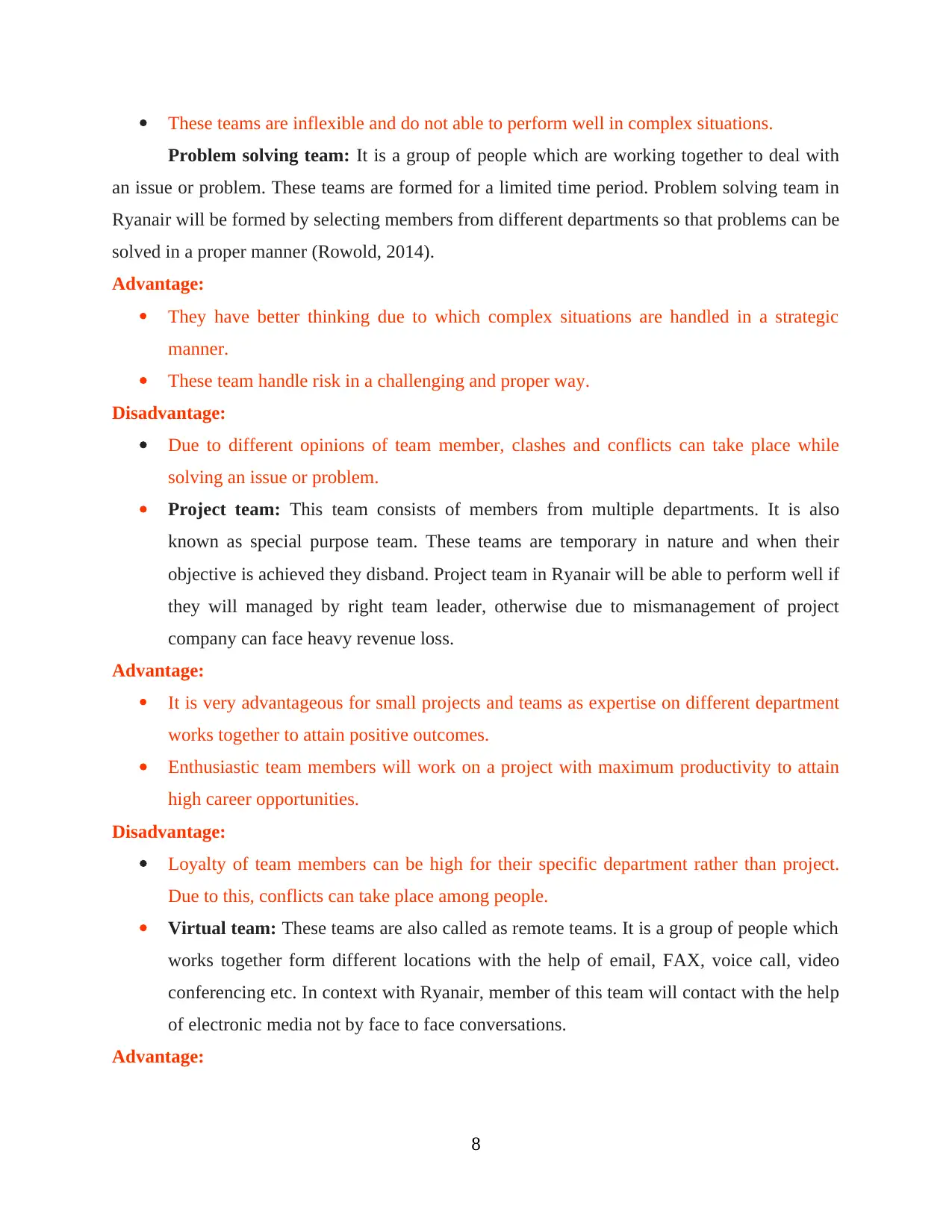
These teams are inflexible and do not able to perform well in complex situations.
Problem solving team: It is a group of people which are working together to deal with
an issue or problem. These teams are formed for a limited time period. Problem solving team in
Ryanair will be formed by selecting members from different departments so that problems can be
solved in a proper manner (Rowold, 2014).
Advantage:
They have better thinking due to which complex situations are handled in a strategic
manner.
These team handle risk in a challenging and proper way.
Disadvantage:
Due to different opinions of team member, clashes and conflicts can take place while
solving an issue or problem.
Project team: This team consists of members from multiple departments. It is also
known as special purpose team. These teams are temporary in nature and when their
objective is achieved they disband. Project team in Ryanair will be able to perform well if
they will managed by right team leader, otherwise due to mismanagement of project
company can face heavy revenue loss.
Advantage:
It is very advantageous for small projects and teams as expertise on different department
works together to attain positive outcomes.
Enthusiastic team members will work on a project with maximum productivity to attain
high career opportunities.
Disadvantage:
Loyalty of team members can be high for their specific department rather than project.
Due to this, conflicts can take place among people.
Virtual team: These teams are also called as remote teams. It is a group of people which
works together form different locations with the help of email, FAX, voice call, video
conferencing etc. In context with Ryanair, member of this team will contact with the help
of electronic media not by face to face conversations.
Advantage:
8
Problem solving team: It is a group of people which are working together to deal with
an issue or problem. These teams are formed for a limited time period. Problem solving team in
Ryanair will be formed by selecting members from different departments so that problems can be
solved in a proper manner (Rowold, 2014).
Advantage:
They have better thinking due to which complex situations are handled in a strategic
manner.
These team handle risk in a challenging and proper way.
Disadvantage:
Due to different opinions of team member, clashes and conflicts can take place while
solving an issue or problem.
Project team: This team consists of members from multiple departments. It is also
known as special purpose team. These teams are temporary in nature and when their
objective is achieved they disband. Project team in Ryanair will be able to perform well if
they will managed by right team leader, otherwise due to mismanagement of project
company can face heavy revenue loss.
Advantage:
It is very advantageous for small projects and teams as expertise on different department
works together to attain positive outcomes.
Enthusiastic team members will work on a project with maximum productivity to attain
high career opportunities.
Disadvantage:
Loyalty of team members can be high for their specific department rather than project.
Due to this, conflicts can take place among people.
Virtual team: These teams are also called as remote teams. It is a group of people which
works together form different locations with the help of email, FAX, voice call, video
conferencing etc. In context with Ryanair, member of this team will contact with the help
of electronic media not by face to face conversations.
Advantage:
8
Paraphrase This Document
Need a fresh take? Get an instant paraphrase of this document with our AI Paraphraser
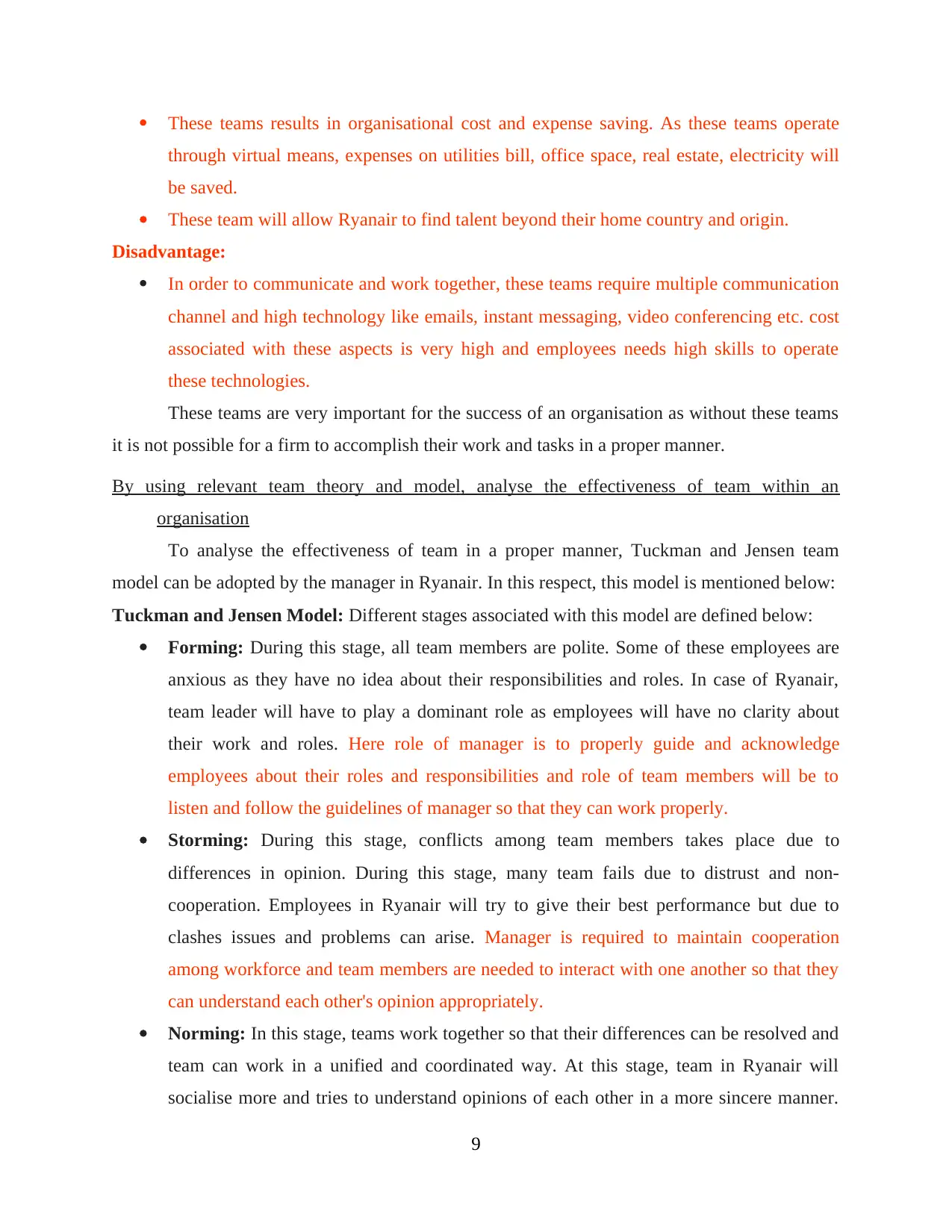
These teams results in organisational cost and expense saving. As these teams operate
through virtual means, expenses on utilities bill, office space, real estate, electricity will
be saved.
These team will allow Ryanair to find talent beyond their home country and origin.
Disadvantage:
In order to communicate and work together, these teams require multiple communication
channel and high technology like emails, instant messaging, video conferencing etc. cost
associated with these aspects is very high and employees needs high skills to operate
these technologies.
These teams are very important for the success of an organisation as without these teams
it is not possible for a firm to accomplish their work and tasks in a proper manner.
By using relevant team theory and model, analyse the effectiveness of team within an
organisation
To analyse the effectiveness of team in a proper manner, Tuckman and Jensen team
model can be adopted by the manager in Ryanair. In this respect, this model is mentioned below:
Tuckman and Jensen Model: Different stages associated with this model are defined below:
Forming: During this stage, all team members are polite. Some of these employees are
anxious as they have no idea about their responsibilities and roles. In case of Ryanair,
team leader will have to play a dominant role as employees will have no clarity about
their work and roles. Here role of manager is to properly guide and acknowledge
employees about their roles and responsibilities and role of team members will be to
listen and follow the guidelines of manager so that they can work properly.
Storming: During this stage, conflicts among team members takes place due to
differences in opinion. During this stage, many team fails due to distrust and non-
cooperation. Employees in Ryanair will try to give their best performance but due to
clashes issues and problems can arise. Manager is required to maintain cooperation
among workforce and team members are needed to interact with one another so that they
can understand each other's opinion appropriately.
Norming: In this stage, teams work together so that their differences can be resolved and
team can work in a unified and coordinated way. At this stage, team in Ryanair will
socialise more and tries to understand opinions of each other in a more sincere manner.
9
through virtual means, expenses on utilities bill, office space, real estate, electricity will
be saved.
These team will allow Ryanair to find talent beyond their home country and origin.
Disadvantage:
In order to communicate and work together, these teams require multiple communication
channel and high technology like emails, instant messaging, video conferencing etc. cost
associated with these aspects is very high and employees needs high skills to operate
these technologies.
These teams are very important for the success of an organisation as without these teams
it is not possible for a firm to accomplish their work and tasks in a proper manner.
By using relevant team theory and model, analyse the effectiveness of team within an
organisation
To analyse the effectiveness of team in a proper manner, Tuckman and Jensen team
model can be adopted by the manager in Ryanair. In this respect, this model is mentioned below:
Tuckman and Jensen Model: Different stages associated with this model are defined below:
Forming: During this stage, all team members are polite. Some of these employees are
anxious as they have no idea about their responsibilities and roles. In case of Ryanair,
team leader will have to play a dominant role as employees will have no clarity about
their work and roles. Here role of manager is to properly guide and acknowledge
employees about their roles and responsibilities and role of team members will be to
listen and follow the guidelines of manager so that they can work properly.
Storming: During this stage, conflicts among team members takes place due to
differences in opinion. During this stage, many team fails due to distrust and non-
cooperation. Employees in Ryanair will try to give their best performance but due to
clashes issues and problems can arise. Manager is required to maintain cooperation
among workforce and team members are needed to interact with one another so that they
can understand each other's opinion appropriately.
Norming: In this stage, teams work together so that their differences can be resolved and
team can work in a unified and coordinated way. At this stage, team in Ryanair will
socialise more and tries to understand opinions of each other in a more sincere manner.
9
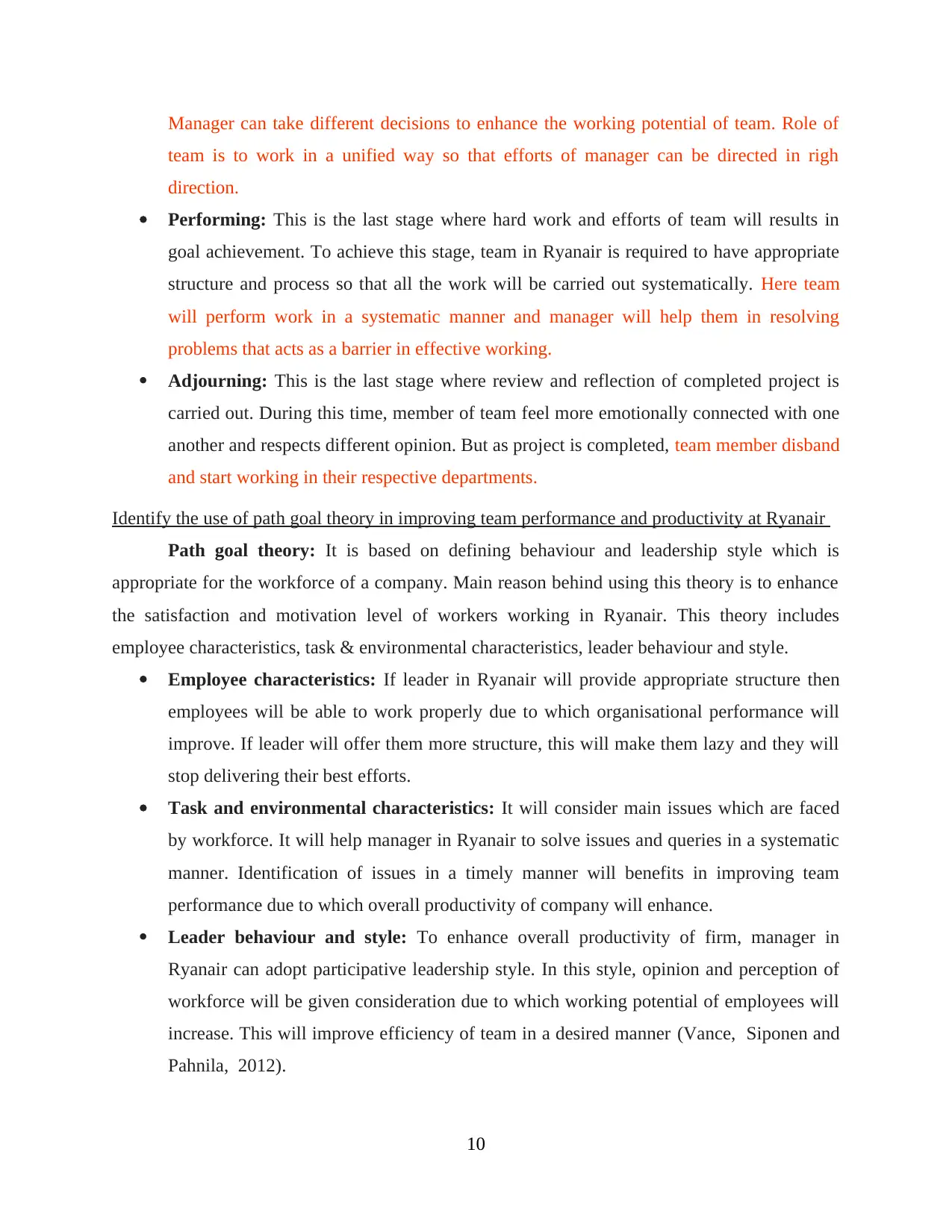
Manager can take different decisions to enhance the working potential of team. Role of
team is to work in a unified way so that efforts of manager can be directed in righ
direction.
Performing: This is the last stage where hard work and efforts of team will results in
goal achievement. To achieve this stage, team in Ryanair is required to have appropriate
structure and process so that all the work will be carried out systematically. Here team
will perform work in a systematic manner and manager will help them in resolving
problems that acts as a barrier in effective working.
Adjourning: This is the last stage where review and reflection of completed project is
carried out. During this time, member of team feel more emotionally connected with one
another and respects different opinion. But as project is completed, team member disband
and start working in their respective departments.
Identify the use of path goal theory in improving team performance and productivity at Ryanair
Path goal theory: It is based on defining behaviour and leadership style which is
appropriate for the workforce of a company. Main reason behind using this theory is to enhance
the satisfaction and motivation level of workers working in Ryanair. This theory includes
employee characteristics, task & environmental characteristics, leader behaviour and style.
Employee characteristics: If leader in Ryanair will provide appropriate structure then
employees will be able to work properly due to which organisational performance will
improve. If leader will offer them more structure, this will make them lazy and they will
stop delivering their best efforts.
Task and environmental characteristics: It will consider main issues which are faced
by workforce. It will help manager in Ryanair to solve issues and queries in a systematic
manner. Identification of issues in a timely manner will benefits in improving team
performance due to which overall productivity of company will enhance.
Leader behaviour and style: To enhance overall productivity of firm, manager in
Ryanair can adopt participative leadership style. In this style, opinion and perception of
workforce will be given consideration due to which working potential of employees will
increase. This will improve efficiency of team in a desired manner (Vance, Siponen and
Pahnila, 2012).
10
team is to work in a unified way so that efforts of manager can be directed in righ
direction.
Performing: This is the last stage where hard work and efforts of team will results in
goal achievement. To achieve this stage, team in Ryanair is required to have appropriate
structure and process so that all the work will be carried out systematically. Here team
will perform work in a systematic manner and manager will help them in resolving
problems that acts as a barrier in effective working.
Adjourning: This is the last stage where review and reflection of completed project is
carried out. During this time, member of team feel more emotionally connected with one
another and respects different opinion. But as project is completed, team member disband
and start working in their respective departments.
Identify the use of path goal theory in improving team performance and productivity at Ryanair
Path goal theory: It is based on defining behaviour and leadership style which is
appropriate for the workforce of a company. Main reason behind using this theory is to enhance
the satisfaction and motivation level of workers working in Ryanair. This theory includes
employee characteristics, task & environmental characteristics, leader behaviour and style.
Employee characteristics: If leader in Ryanair will provide appropriate structure then
employees will be able to work properly due to which organisational performance will
improve. If leader will offer them more structure, this will make them lazy and they will
stop delivering their best efforts.
Task and environmental characteristics: It will consider main issues which are faced
by workforce. It will help manager in Ryanair to solve issues and queries in a systematic
manner. Identification of issues in a timely manner will benefits in improving team
performance due to which overall productivity of company will enhance.
Leader behaviour and style: To enhance overall productivity of firm, manager in
Ryanair can adopt participative leadership style. In this style, opinion and perception of
workforce will be given consideration due to which working potential of employees will
increase. This will improve efficiency of team in a desired manner (Vance, Siponen and
Pahnila, 2012).
10
⊘ This is a preview!⊘
Do you want full access?
Subscribe today to unlock all pages.

Trusted by 1+ million students worldwide
1 out of 14
Related Documents
Your All-in-One AI-Powered Toolkit for Academic Success.
+13062052269
info@desklib.com
Available 24*7 on WhatsApp / Email
![[object Object]](/_next/static/media/star-bottom.7253800d.svg)
Unlock your academic potential
Copyright © 2020–2026 A2Z Services. All Rights Reserved. Developed and managed by ZUCOL.





